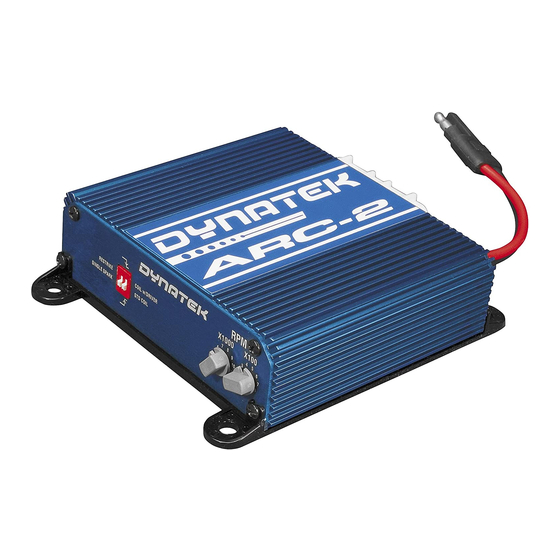DYNATEK ARC-2 Manuel - Page 4
Parcourez en ligne ou téléchargez le pdf Manuel pour {nom_de_la_catégorie} DYNATEK ARC-2. DYNATEK ARC-2 10 pages.

Some coils have the drive circuitry (the part that draws the current through
the coil to charge the coil) built into the coil itself. In other applications, that
drive circuitry is built into the ECU, or built into a separate device sometimes
called a power transistor.
A CD Ignition will NOT work with a coil that has the drive circuitry built into
the coil. In order to make a CD Ignition work on those vehicles, you must
replace the coils with coils that do not have that drive circuitry. These vehi-
cles usually also have a coil signal that is inverted from a standard coil signal.
So the CD Ignition has to be capable of reading this inverted signal. The
ARC-2 can be set up to work with standard coil signals, or inverted signals,
like those used by coils with driver circuitry built in.
The most common way to identify a coil with the drive circuitry built in is
looking at its wiring:
A standard single or dual output ignition coil will have 2 wires
- a wire to 12V, and a wire to the ECU power transistor.
A 4 output standard ignition coil will have 3 wires
– a wire to 12V, and 2 wires to the ECU or power
transistor. Each of the 2 wires controls 2 of the 4 coil
outputs.
A single or dual output coil with drive circuitry will have 3 wires
– a wire to 12V, a wire to ground, and a wire from the
ECU. Some models of coil have an addition wire back to
the ECU, to monitor the coil output.
Not all coils will conform to this, so it is a good idea to consult the vehicle owner's manual for wiring diagrams of the coils
before attempting to do any wiring.
Some vehicles have external power transistors, which are the circuits that control the current flow in inductive coils. If
installing on a vehicle with a power transistor, you have 2 choices. You can install the ARC-2 between the power transistor
and coil, and set it up like a standard coil. Or you can remove the power transistor, and wire the ARC-2 directly to the ECU
and coil, and set the ARC-2 up as if you were replacing a coil w/driver.
In addition to the above, when trying to select coils for use with a CDI, you should pick coils with a relatively low primary
resistance, preferably under 0.5 ohm.
Spark Plugs
The high voltage short duration of a CD Ignition allows it to fire across spark plug gaps that are too large for standard induc-
tive coils. Oftentimes, inductive ignitions will require that a spark plug gap be decreased from stock to work under boost. With
a CD Ignition, the gap can usually be left at the factory setting or even increased over stock. The amount of allowable gap will
vary based on vehicle, coil, and cylinder pressure. So while there is no set value to use, starting with the OE recommended
plug gap is a safe bet. A colder plug may also be necessary.
Use with an aftermarket ECU
Aftermarket ECUs often have programmable dwell times, as well as programmable ignition timing tables. These dwell values
may be set up to vary with battery voltage. For a CDI, there is no need for a dwell time, or to vary it with battery voltage, but
the dwell time should be a nonzero value. Some ECUs come with a CDI output option, which would be good to use.
Some ECUs are offered as plug-n-play and should control the coils very close to the same as the stock ECU. You should
be able to use the ARC-2 with it just as if it were a stock ECU.
ARC-2
Asynchronous Restriking CDI
2801211
- 4
